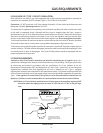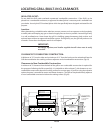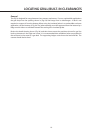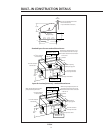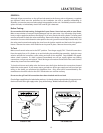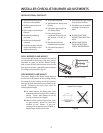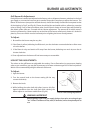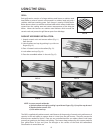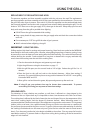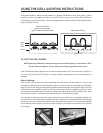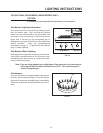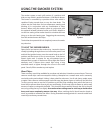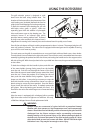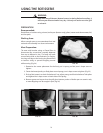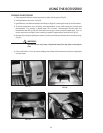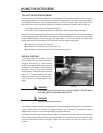
16
REPLACEMENT OF REGULATORS AND HOSE:
The pressure regulator and hose assembly supplied with the unit must be used. The replacement
pressure regulators and hose assembly must be the type specified by the manufacturer. Do not use
the grill if the odor of gas is present. If the unit is LP, screw the regulator into the tank and leak check
the hose and regulator connections with a soap and water solution before operating the grill. Turn all
knobs to "OFF" then turn on the gas supply. If LP, is there gas in the tank? Always keep your face and
body as far away from the grill as possible when lighting.
DO NOT leave the grill unattended while cooking.
Keep a spray bottle of soapy water near the gas supply valve and check the connections before
each use.
Do not attempt to "LITE" the grill if the odor of gas is present.
Wait 5 minutes before relighting a hot grill.
IMPORTANT - USING THE GRILL:
Grilling requires high heat for searing and proper browning. Most foods are cooked at the “MEDIUM”
heat setting for the entire cooking time. However,when grilling large pieces of meat or poultry,it may
be necessary to turn the heat to a lower setting after the initial browning. This cooks the food through
without burning the outside. Foods cooked for a long time or basted with a sugary marinade may
need a lower heat setting near the end of the cooking time.
1. Check to be certain the drip pan and grease tray are in place.
2.Light the grill burners using the instructions on page 17.
3.With the grill lid open, turn the control knob to “HI” to light. Preheat the grill for 5 to 10
minutes.
4.Place the food on the grill and cook to the desired doneness. Adjust heat setting, if
necessary. The control knob may be set to any position between “HI”and “LO”- most grilling
is between “MED” and “LO”.
5.Allow grill to cool and clean the grates,drip pan and grease tray after each use.
Note: If using LP gas, your preheat time may be shorter than recommended. To prevent
overcooking or burning you may want to lower heat settings.
GRILLING HINTS:
The doneness of meat, whether rare, medium, or well done, is affected to a large degree by the
thickness of the cut. Expert chefs say it is impossible to have a rare doneness with a thin cut of meat.
The cooking time is affected by the kind of meat,the size and shape of the cut,the temperature of the
meat when cooking begins, and the degree of doneness desired. When defrosting meats it is
recommended that it be done overnight in the refrigerator as opposed to a microwave. This in general
yields a juicier cut of meat. Use a spatula instead of tongs or a fork to turn the meat,as a spatula will
not puncture the meat and let the juices run out. To get the juiciest meats,add seasoning or salt after
the cooking is finished and turn the meat only once (juices are lost when the meat is turned several
times). Turn the meat just after the juices begin to bubble to the surface. Trim any excess fat from the
meat before cooking. To prevent steaks or chops from curling during cooking, slit the fat around the
edges at 2-inch intervals.
USING THE GRILL



